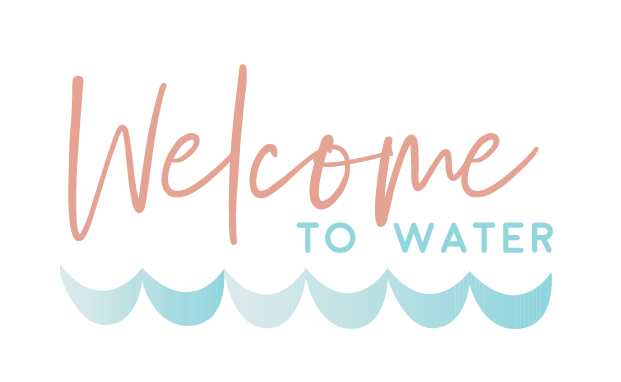Bath time with your 3 month old
Jessie Jones
My how your baby has grown! A bit bigger and getting a whole lot smarter each day too. They really love to be cuddled and research shows that hugs can increase your babies cognitive development as well. This is the month that your baby can start their first non submersion baby swimming lesson at your local Welcome to water provider swim school. A huge milestone for both of you, babies first swimming lesson 💦
We all want to stimulate our babies development and shift their brain into high gear. Singing, talking and reading to her are three great ways to help her learn how language works and conversation goes back and forth. Bath time and swimming lessons are great places to sing songs and share stories together.
Developmental milestones and Bath activities for your 3 Month old:
Imitates you when you stick out your tongue and responds to different facial expressions ~ Lay her back on your drawn up thighs and chat and sing to her as you make different facial expressions. Try poking tongues too and give her plenty of opportunity to mimic you.
Visually tracks moving objects and grips objects in hands ~ Choose some of her favourite bath toys and tell her an animated story about them as you move them from one side of her body to the other. Watch as she tracks them with her head and eyes. Slow the speed of the movements if needed. Let her reach out and grip onto some during the story.
Makes eye contact & Shows interest in faces ~ Get your partner involved and play a game of peekaboo with a wash cloth. Take turns hiding behind the cloth and making eye contact with her when the cloth is removed. Try playing this game with toys as well.
Makes eye contact & Shows interest in faces ~ Get your partner involved and play a game of peekaboo with a wash cloth. Take turns hiding behind the cloth and making eye contact with her when the cloth is removed. Try playing this game with toys as well.
Sense of touch becomes more sensitive ~ Give her body a gently massage with different textured cloths, sponges and your hands while you sing to her in the bath. You can try this activity after the bath too, using things like a tissue, fur and felt to stroke her body.
Write your awesome label here.
Write your awesome label here.
prepare for your bath together:
💦 Is baby calm, fed & relaxed? Wait at least 10mins after a feed
💦 Water temp between 30 - 33 degrees c. Do a wrist test, water should be warm to touch but not hot
💦 Be prepared to safely enter/exit the bath
💦
Dim lights & warm room
💦 Protect their airway, no water pouring over their face
💦 Have a wash cloth, little cup/watering can & textured bath toys ready on the side of the bath
Prepare the following before you bathe together:
🛁 Fill the bath to around half way up your legs in a reclined seated position with knees up
💡 Dim the lights, warm up the room and towels if needed, light candles and place your favourite essential oil in a diffuser
🎵 You may want to play some soft soothing music
👚 Have a fresh nappy and clothes for both you and baby ready & your towels near by for when you are finished
How to safely enter and exit the bath:
Have someone help pass baby to you once you are seated in the bath, and pass baby to them again for a safe exit
If a helper isn't present use a baby bouncer seat, car seat or place baby on towels or a soft surface on the floor
Ensure you are seated in the bath first when handling baby for a safe entry and exit
Write your awesome label here.
Write your awesome label here.
Supported Back float and breath control activities:
Supported back float:
Lay her back on your chest in a reclined seated position. Cradle her head and place the other hand under her back. Slowly begin to slide her down into a back float between your legs, work towards a supported back float with her ears under water. Allow her to feel the floatation effects of the water and really relax into her float as the world goes a bit quiet. Gentle side to side and up and down swaying movements while she floats will give her feedback all over her skin. Find some time to make extended eye contact and smile at each other.
Reading and reacting to your babies cues throughout this special experience helps to build trust and communication between you. As baby is experiencing the bath environment let her be your guide, return her to a cradle or chest to chest hold to help her feel more secure or exit the bath safety if she has had enough.
Breath control:
Breath control:
Help your infant transition to a voluntary breath-hold, in response to your cues.
Around 3 months of age, infants begin to integrate reflexive responses into voluntary actions. Try some of these practices once your baby is showing the correct signs of readiness, like following and reaching for a cup of water.
Seat baby on your lap to one side, so you can see her face. Support her with an arm wrapped around her back and the hand under her armpit. Watch her facial reactions to the cues and for any body language and cues she has had enough.
Wet cloth: Cue baby "Name, ready go" Wipe baby’s face from top to bottom. Practice this a few times each bath, Let baby recover and watch for their breathing to come back to normal between each turn.
Cup of water: Cue baby "Name, ready go" pour on the forehead with a water shot. After the baby becomes familiar with this activity and responds positively for a few weeks, progress to an extended 2-second and then 3-second pour on the forehead. Practice this a few times each bath, Let baby recover and watch for their breathing to come back to normal between each turn.
Shower: Cue baby "Name, ready go" Start with momentarily under the shower.
Progress to 2 seconds and then 3 seconds under the shower. Practice this a few times each shower, Let baby recover and watch for their breathing to come back to normal between each turn.
Read and respond to your babies cues and stop the activity BEFORE your baby has had enough for the day or isn't enjoying the activity. This will build trust and communication between you and ensure that baby is happy to try again next time knowing you will respond to how she feels.
These fun bath time activities help form a great base for baby swimming lessons together. From here keep learning together on a force free introduction to water, sign up for your free online baby swimming course & baby swim lessons at your local Welcome to water provider. Your baby can start non submersion swimming lessons from 3 months of age at your local welcome to water provider swim school.
Creating regular time to spend with your baby in the bath, pool and at your baby swim lessons will set up a bond between you like no other, not to mention all the added benefits baby swimming lessons and water play will bring into your lives 🙌
Thank you!
CLICK THE LINK BELOW
to join our free online course, and help give your child the best possible start on their learn to swim journey.
to join our free online course, and help give your child the best possible start on their learn to swim journey.
Write your awesome label here.
Write your awesome label here.
Write your awesome label here.
Love our information? Click on sign up below, and receive a monthly update on your child's birthday, following their development with tips and tricks to do at home in the bath or pool.

© Welcome to Water
Subscribe to our newsletter now!
Get weekly updates on live streams, news and more right in your mailbox.
Thank you!

